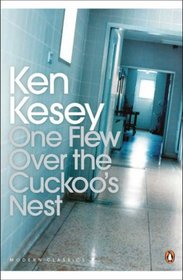Glauber R. (glauber) reviewed One Flew Over the Cuckoo's Nest (Penguin Modern Classics) on + 48 more book reviews
Helpful Score: 2
An epic struggle of good against evil, human against machine, willpower against absolute power, pits the archetypal American hero - cowboy, fighter, hustler, gambler - against the cold efficient machinery of power. In the end, you get to decide who won.
One of the greatest American novels.
One of the greatest American novels.
Sarah O. reviewed One Flew Over the Cuckoo's Nest (Penguin Modern Classics) on + 5 more book reviews
Helpful Score: 2
Boisterous, ribald, and ultimately shattering, this is the unforgettable story of a mental ward and its inhabitants, especially the tyrannical Big Nurse and Randle Patrick McMurphy, the brawling, life-loving new inmate who resolves to oppose her. We see the struggle through the eyes of Chief Bromden, the seemingly mute half-Indian patient, who witnesses and understands McMurphy's heroic attempt to do battle with the awesome power of The Combine.
Kristin L. (beautyredefined) reviewed One Flew Over the Cuckoo's Nest (Penguin Modern Classics) on + 32 more book reviews
Helpful Score: 1
Life in an asylum through the eyes of a patient paints an interesting picture. When the monotony of the ward's daily life is interrupted by a boisterous new patient, McMurphy, the authoritative Big Nurse knows that her way of running the hospital is threatened. In the all-out psychological battle that ensues, the other patients (our narrator included) are changed forever.
Melissa J. (babyvicious27) reviewed One Flew Over the Cuckoo's Nest (Penguin Modern Classics) on + 2 more book reviews
Helpful Score: 1
My favorite book!
Candace P. reviewed One Flew Over the Cuckoo's Nest (Penguin Modern Classics) on + 11 more book reviews
Helpful Score: 1
FROM THE PUBLISHER
"In the early 1960s, fresh out of Stanford's creative writing program, Ken Kesey supported himself by working as an attendant at a psychiatric hospital. It was there that he wrote what became his first novel, One Flew Over the Cuckoo's Nest, which Viking released on February 1, 1962. This hardcover edition, which includes new introductions and more than twenty-five line drawings that Kesey made while composing the novel, commemorates the fortieth anniversary of the publication of this American classic." Boisterous, ribald, and ultimately shattering, this is the unforgettable story of a mental ward and its inhabitants, especially the tyrannical Big Nurse Ratched and Randle Patrick McMurphy, the brawling, fun-loving new inmate who resolves to oppose her. We see the struggle through the eyes of Chief Bromden, the seemingly mute half-Indian patient who witnesses and understands McMurphy's heroic attempt to do battle with the awesome power of the Combine. Hailed upon its publication as "a glittering parable of good and evil" (The New York Times Book Review) and "a roar of protest against middlebrow society's Rules and the invisible Rulers who enforce them" (Time), this powerful book is as bracing and insightful today as it was in the 1960s.
"In the early 1960s, fresh out of Stanford's creative writing program, Ken Kesey supported himself by working as an attendant at a psychiatric hospital. It was there that he wrote what became his first novel, One Flew Over the Cuckoo's Nest, which Viking released on February 1, 1962. This hardcover edition, which includes new introductions and more than twenty-five line drawings that Kesey made while composing the novel, commemorates the fortieth anniversary of the publication of this American classic." Boisterous, ribald, and ultimately shattering, this is the unforgettable story of a mental ward and its inhabitants, especially the tyrannical Big Nurse Ratched and Randle Patrick McMurphy, the brawling, fun-loving new inmate who resolves to oppose her. We see the struggle through the eyes of Chief Bromden, the seemingly mute half-Indian patient who witnesses and understands McMurphy's heroic attempt to do battle with the awesome power of the Combine. Hailed upon its publication as "a glittering parable of good and evil" (The New York Times Book Review) and "a roar of protest against middlebrow society's Rules and the invisible Rulers who enforce them" (Time), this powerful book is as bracing and insightful today as it was in the 1960s.




